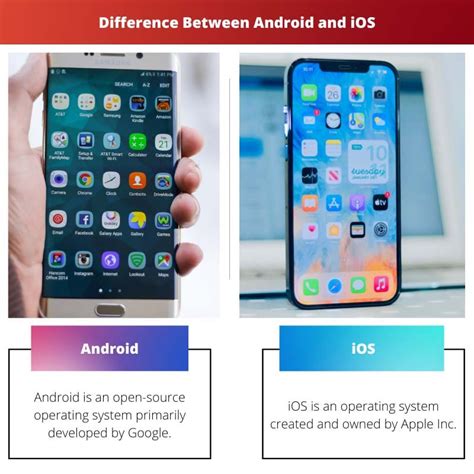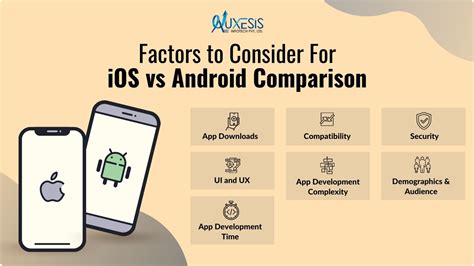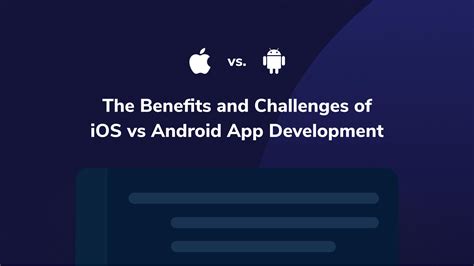Gone are the days when phones were merely communication devices. With the advent of smartphones, they have become an integral part of our lives, aiding in various aspects of our daily routines.
In this technologically driven era, the majority of individuals rely heavily on mobile applications for entertainment, work, and staying connected with their loved ones. However, when it comes to choosing the perfect mobile operating system that suits their needs, many people find themselves torn between the two major players in the market: Android and iOS.
While both operating systems offer an array of features, they possess distinctive qualities that set them apart from one another. Whether you prioritize customization, security, user-friendliness, or app availability, each platform has its own strengths and weaknesses.
It's important to consider various factors before making a decision–a decision that will impact your smartphone usage experience greatly. By understanding the key differences between Android and iOS, you can determine which operating system aligns better with your requirements and preferences.
Understanding the Distinctions between Android and iOS

When it comes to choosing a mobile operating system, it is crucial to comprehend the disparities between the two leading platforms, Android and iOS. By having a clear understanding of the dissimilarities, users can make an informed decision based on their individual preferences and needs.
One key aspect to consider is the user interface. Both Android and iOS offer unique interfaces that cater to different user experiences. While Android focuses on customization and flexibility, iOS prioritizes a simplified and user-friendly design. This fundamental contrast dictates how users interact with their devices and the overall aesthetics they prefer.
Another important distinction lies in the app marketplaces of Android and iOS. Android's Google Play Store boasts a vast array of applications, including third-party options, granting users more freedom when it comes to app selection. Conversely, iOS's App Store is known for its strict guidelines and curated collection, ensuring a more quality-controlled and secure experience.
Device compatibility also plays a role in differentiating Android and iOS. Android operates on various smartphone brands and models, offering a broader range of choices to consumers. In contrast, iOS is exclusive to Apple devices, limiting the options but ensuring a seamless integration between software and hardware for optimized performance.
Moreover, the approach to software updates varies between the two platforms. Android offers frequent updates and customization options, allowing users to tailor their devices to their preferences. On the other hand, iOS provides regular and consistent updates across its devices, ensuring uniform security measures and performance enhancements.
In conclusion, comprehending the variations between Android and iOS is essential in selecting the most suitable platform for one's mobile needs. By considering elements such as user interface, app marketplaces, device compatibility, and software updates, individuals can make an informed decision that aligns with their personal preferences and requirements.
Comparing the Key Features and Functionalities
When it comes to choosing between the two dominant mobile operating systems, one must delve into the depths of the unique characteristics and functionalities offered by each. In this section, we will explore the distinctive traits of each platform, shedding light on their key features and capabilities.
1. User Interface: The user interface plays a crucial role in determining the overall experience on a mobile device. Both Android and iOS offer intuitive interfaces that cater to diverse user preferences. While Android provides a highly customizable interface, allowing users to personalize their devices to a greater extent, iOS offers a sleek and uniform design, ensuring a seamless user experience.
2. App Ecosystem: Apps form the backbone of any modern smartphone, and the availability and quality of apps can greatly influence one's choice of operating system. Android boasts a vast app ecosystem, with an array of options available on the Google Play Store. On the other hand, iOS may have a relatively smaller collection of apps, but it is known for its curated selection, ensuring high quality and security standards.
3. Device Compatibility: The compatibility of the operating system with various devices is another factor to be considered. Android offers a wide range of devices, from budget-friendly options to premium smartphones, catering to different price points and user needs. In contrast, iOS is specifically designed for Apple devices, providing a seamless integration and synchronization across the entire ecosystem of Apple products.
4. Customization and Control: For those who value customization and control over their mobile experience, Android tends to offer more flexibility. With Android, users can personalize their devices, install third-party apps, and even modify system settings, allowing for a tailored experience. Conversely, iOS maintains a more locked-down approach, prioritizing security and stability over extensive customization.
5. Voice Assistant: Virtual assistants have become an integral part of our daily lives, with both Android and iOS incorporating their own versions. Android features Google Assistant, which boasts advanced natural language processing capabilities, offering a range of useful features. Meanwhile, iOS prides itself on Siri, known for its seamless integration with Apple devices and its ability to deliver personalized recommendations.
6. Security and Privacy: Security and privacy have become paramount concerns in the digital era. Android and iOS tackle these issues differently, with Android providing a more open-source platform that allows for greater customization but may be more susceptible to malware. iOS, on the other hand, employs a closed ecosystem to ensure stringent security measures, making it less prone to external threats.
By examining these key features and functionalities, one can gain valuable insights into the fundamental differences between Android and iOS, aiding in the decision-making process of choosing the ideal mobile operating system that aligns with individual preferences and requirements.
Making a Choice: Factors to Consider when Selecting between Android and iOS

When determining whether to go with an Android or iOS device, there are several important factors to take into account that will assist in making an informed decision.
- Customization Options
- App Availability and Quality
- Hardware Variety
- Integration with Other Devices
- Security and Privacy
One of the key factors to consider is the level of customization each operating system offers. Android provides a high degree of customization, allowing users to personalize their home screens, widgets, and overall interface according to their preferences. iOS, on the other hand, offers a more streamlined and consistent user experience with limited customization options.
Another crucial aspect to consider is the availability and quality of apps on each platform. While iOS tends to have a more extensive selection of apps, Android is known for its open-source nature and wide range of app choices. It is important to identify the specific apps that you regularly use or require and determine which platform offers better options for your needs.
Both Android and iOS devices come in a variety of models from numerous manufacturers. Android devices offer a wider range of options in terms of screen sizes, designs, and price points, catering to different preferences and budgets. On the other hand, iOS devices maintain a more limited but consistent range of hardware options, ensuring a seamless integration of hardware and software.
If you already own other devices such as smartwatches, tablets, or smart home devices, it is important to consider the level of integration each operating system provides. Android devices, due to their open nature, generally have better compatibility and interoperability with various devices from different brands. In contrast, iOS devices offer a more seamless integration within the Apple ecosystem, ensuring smoother synchronization and connectivity between Apple devices.
Security and privacy are significant concerns when selecting a mobile operating system. iOS has a reputation for its strong security measures and strict app review process, making it less susceptible to malware and other vulnerabilities. Android, on the other hand, requires users to be more vigilant in terms of app permissions and downloading apps from reliable sources. However, recent updates have made Android devices more secure, with advanced security features and regular security patches.
By considering these factors, you can make an informed decision on which operating system aligns best with your preferences, needs, and priorities.
Evaluating factors such as design, customization, app availability, and ecosystem
When considering which mobile operating system to choose, it's important to evaluate various factors that can greatly impact your overall experience. These factors encompass crucial aspects such as design aesthetics, customization options, app availability, and the overall ecosystem of the platform.
One key factor to consider is the design of the operating system. Design not only includes the visual appeal and layout but also the user interface and user experience. The design of an operating system can greatly influence how intuitive and enjoyable it is to use, making it an important consideration for users.
Customization is another crucial factor that distinguishes between different operating systems. Some users prioritize the ability to personalize their devices, while others prefer a more streamlined and consistent experience. Customization options can range from simple personalization of wallpapers and themes to more advanced features like changing icons and widgets.
App availability is an important consideration for users who heavily rely on mobile applications. Both Android and iOS have extensive app stores, but there may be variations in terms of the availability of specific apps. Evaluating app availability is particularly relevant for professionals and individuals who require certain apps for work or specific purposes.
Furthermore, the overall ecosystem of an operating system can greatly impact its appeal and functionality. The ecosystem includes factors such as integration with other devices, compatibility with accessories, and the availability of cloud services. A well-developed ecosystem can provide seamless connectivity and enhance the overall user experience.
By carefully assessing factors such as design aesthetics, customization options, app availability, and the overall ecosystem, one can determine which mobile operating system aligns best with their preferences and requirements.
Comparing User Experiences: Evaluating the Advantages of Android and iOS

When it comes to choosing between Android and iOS, one crucial aspect to consider is the user experience provided by each platform. Both Android and iOS systems offer unique features and functionalities that cater to different user preferences and needs. Understanding the differences in user experience can help you make an informed decision and select the operating system that aligns best with your requirements.
- Customization: One key factor that sets Android apart is its high level of customization. Android allows users to personalize various aspects of their devices, such as the home screen, widgets, and default apps. This flexibility empowers users to tailor their Android experience to their liking and create a unique interface.
- App Store Variety: Another aspect to consider is the variety of apps available in the respective app stores. While the Apple App Store offers a curated selection of apps, the Google Play Store boasts a larger quantity and wider variety. This means that Android users have access to a broader range of applications and can explore different options.
- System Integration: One notable advantage of iOS is its seamless integration with other Apple devices and services. If you are already using an iPhone, iPad, or Mac, choosing iOS allows for effortless synchronization and sharing of data between your devices. This tight ecosystem can enhance productivity and streamline your digital experience.
- Security and Privacy: Both Android and iOS have made significant strides in prioritizing security and privacy in their operating systems. However, iOS is often praised for its stringent security measures and robust privacy settings. Apple's closed ecosystem and strict app review process help minimize the risk of malware and data breaches, providing users with peace of mind.
- Hardware and Performance Optimization: Apple's tight control over hardware and software integration allows for optimized performance on iOS devices. The company's vertically integrated approach ensures that iOS runs seamlessly on their devices, resulting in smooth animations, faster updates, and consistent performance. Android, on the other hand, offers a wide range of device options from various manufacturers, allowing users to choose devices that suit their specific budget and requirements.
Ultimately, the choice between Android and iOS depends on your personal preferences, desired level of customization, app store variety, ecosystem integration, security concerns, and performance optimization. By considering these factors, you can determine which platform offers a better user experience that aligns with your needs and enhances your overall mobile experience.
Comparing the user experience on Android and iOS devices
When it comes to choosing between different smartphone operating systems, one of the key factors to consider is the user experience. Both Android and iOS offer their own unique takes on how to interact with a mobile device, catering to different user preferences and needs.
To better understand the user experience on Android and iOS devices, it is important to examine various aspects of their interface and functionality. Let's delve into some of the key factors that differentiate the two operating systems:
- Customization: Both Android and iOS allow some level of customization, but Android tends to offer more flexibility in terms of personalizing the device's appearance and behavior. With iOS, on the other hand, users generally experience a more uniform and consistent interface.
- Navigation and Interaction: Android provides users with a range of navigation options, including physical buttons, gesture controls, and virtual navigation bars. iOS, on the other hand, relies heavily on gesture-based navigation and a simplified, buttonless design.
- App Selection: The availability and variety of applications can greatly influence the user experience. Android boasts a larger number of apps in its Google Play Store, offering users a wider selection to choose from. iOS, known for its curated App Store, focuses on quality over quantity.
- Updates and Compatibility: Android devices often have longer update cycles due to the fragmentation of the operating system across different manufacturers and models. In contrast, iOS updates are typically available to all supported devices simultaneously, ensuring a consistent and up-to-date experience.
- Integration with Ecosystem: Apple's iOS devices are tightly integrated with its ecosystem of products and services, allowing for seamless connectivity and synchronization. Android, being an open-source platform, offers more compatibility with a variety of third-party devices and services.
In conclusion, the user experience on Android and iOS devices presents distinct characteristics that cater to different preferences and needs. Android offers greater customization and device compatibility, while iOS provides a more seamless and consistent experience within the Apple ecosystem. Ultimately, the choice between the two depends on individual priorities and preferences.
Security and Privacy: Comparing the Protection and Confidentiality Features of Android and iOS

When it comes to the realm of mobile devices, ensuring the security and privacy of our personal information has become increasingly crucial. Both Android and iOS offer various features and measures to protect user data and preserve confidentiality. This section delves into the security and privacy aspects of these operating systems to provide you with a comprehensive understanding of their differences and similarities.
- Platform Vulnerabilities: Understanding the susceptibility of each operating system to potential security breaches
- App Permissions: Exploring the control users have over granting permissions to applications on Android and iOS
- Data Encryption: Analyzing the encryption methods used by Android and iOS to safeguard sensitive information
- Biometric Authentication: Comparing the utilization of fingerprint and facial recognition technologies for secure access to mobile devices
- Privacy Settings: Examining the privacy settings and options available on Android and iOS to control data sharing and tracking
- App Store Security: Evaluating the measures taken by both platforms to ensure the safety and authenticity of applications
- Mobile Payment Security: Investigating the security frameworks implemented by Android and iOS for secure mobile transactions
By comprehending the security and privacy features of Android and iOS, you can make an informed decision about which operating system aligns better with your preferences and requirements. Keep in mind that while both platforms prioritize the protection of user data, they may differ in terms of approach and implementation.
[MOVIES] [/MOVIES] [/MOVIES_ENABLED]FAQ
What are the main differences between Android and iOS?
Android and iOS are two different mobile operating systems with distinct features. Android offers more customization options and a wide range of device choices, while iOS provides a more consistent and user-friendly experience across Apple devices.
Which operating system is more secure: Android or iOS?
In terms of security, iOS is often considered more secure than Android. Apple implements strict regulations and controls over its app store to prevent malicious software, while Android's open-source nature makes it more susceptible to malware if users download apps from unreliable sources.
Which mobile platform offers a larger selection of apps?
Both Android and iOS have extensive app stores with millions of apps, but Android generally has a larger selection due to its open-source nature. Developers often prioritize Android when releasing new apps, making it a better choice for those who want a wider range of options.
Can I easily switch from Android to iOS or vice versa?
Switching from Android to iOS or vice versa can be a bit challenging due to the different system architectures and app compatibility. However, both platforms offer tools and services to transfer data from one device to another, making the process easier.
Which operating system is better for privacy and data protection?
Both Android and iOS have made significant improvements in privacy and data protection in recent years. However, iOS generally has an edge in this aspect. Apple is known for its strong stance on user privacy and implements robust security features to safeguard personal data.
What are the main differences between Android and iOS?
Android and iOS have several key differences. Android is an open-source operating system developed by Google, allowing for more customization and freedom. iOS, on the other hand, is a closed operating system developed by Apple, offering a more secure and stable experience. Additionally, Android devices come from a variety of manufacturers, offering a wider range of options, while iOS devices are solely produced by Apple.
Which operating system is more popular, Android or iOS?
Android is currently the more popular operating system. This is largely due to the fact that Android is available on a wide range of devices from different manufacturers, providing a larger market share. iOS, on the other hand, is exclusive to Apple devices, which limits its overall market presence. However, iOS still maintains a significant user base and has a strong reputation for its security and user experience.




